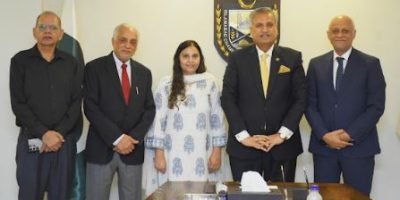Rice exporters organize training to protect rights of agri women’s children

ISLAMABAD, Sep 10 :Top rice exporters of Pakistan Thursday arranged training workshop to train the women as well as rice millers to sensitize them regarding basic Juvenile right of the children of female agriculture workers, especially the rice transplanters.
“We are providing best facilities for promoting decent working conditions for the rice transplanter women and their children in rice value chain from agro-fields to rice mills, said Zafar Iqbal, Country Manager of Sustainability and Corporate Social Responsibility (CSR) of Rice Partners Ltd (RPL), a rice exporting and philanthropic organization, addressing the training workshop here.
The organization including Rice Partners Ltd (RPL) in collaboration with Helvetas Pakistan organized the one day training workshop on “Promoting Decent Working Conditions to Ensure Sustainable Rice Production”, by Rice Partners Ltd (RPL), Helvetas Swiss Intercooperation here.
Zafar Iqbal said that at the training workshop they were engaging the women workers of the rice fields and 40 rice mills coming from major rice businesses of Punjab province.
He said that the organization had trained 30,000 of female rice transplanters and also provided them awareness on juvenile rights.
He said that RPL had prioritized to provide awareness for protection of rice transplanter children, including the families working in whole rice value chain to provide them decent working environment.
Zafar said RPL was a social impact business that worked with thousands of growers of Basmati rice in Punjab to provide them with the best growing practices for enhancing their yields and livelihoods.
He said around 15000 families were engaged only from district Sheikhupura and more then 100,000 from all over the Punjab.
Usually all members from a family take part in transplanting work, he added.
Zafar said that children from those families also accompanied their parents.
While addressing the training workshop, renowned senior child rights activist and consultant Sadia Hussain said that physical, emotional and psychological health of children belonging to agriculture workers must be considered for conducive working environment in rice value chain.
She said that physical and mental torture not badly impacted the children’s life but also suffered the working condition.
She said that the protection of children and vulnerable adults was a collective societal responsibility.
Sadia Hussain said that the right to name, health, food, education, freedom of expression and association children must be protected besides the right to respect regardless of race, colour and creed.
She such children must be protected against abuses and violence like forced labor and any physical or emotional torture.
Senior Corporate and Development sector Consultant, Annan Waffi Qureshi on the occasion said that juvenile right should be prioritized in every sector including agriculture side.
He highlighted the mode of communication to create the awareness for children right and their protection, especially who are belongs to the families working in rice value chain.
On the occasion, Field Manager, Helvetas Swiss Intercooperation, Zahid Rehman said that they were providing these children with the moveable backpack canopies covered from all sides to avoid the insects and provision of shelters along with the dry food, repellents, and water coolers in rice cultivation region of the Punjab.
Zahid Rehman said that working conditions of the farm were highly hazardous and exposed children to several risks of insect bites, injuries and infections, exposure to extreme heat and pesticides without any shelter.
Similarly, for the larger group of families working jointly a farm level, a bigger shelter tent along with solar plates, fans, air cooler, water cooler and first aid boxes were provided to keep the children in a healthy and safe environment at farm level, he said.
More than 40 rice mills including organizations from development sectors, academia and media personnel participated in the event.
Related News

RCCI to Organize 2-Day Med-Health Expo & Summit on July 29
DNA Rawalpindi, July 22 — The Rawalpindi Chamber of Commerce and Industry (RCCI) is setRead More

ICCI, ICADRP join hands to promote alternate dispute resolution for business community
ISLAMABAD, JUL 21 /DNA/ – In a major step toward promoting a culture of mediationRead More


Comments are Closed